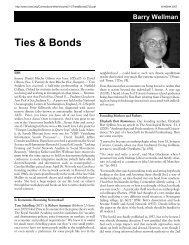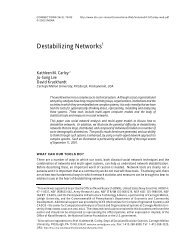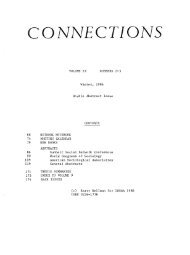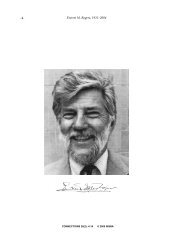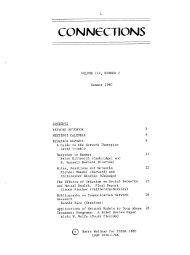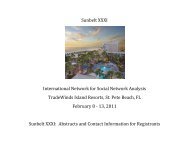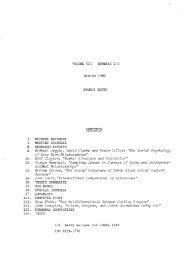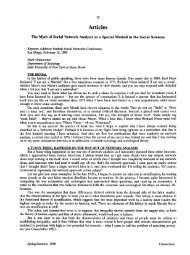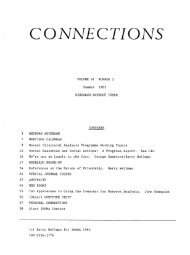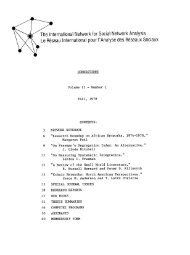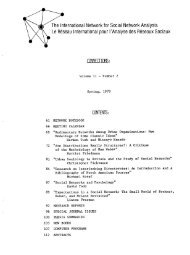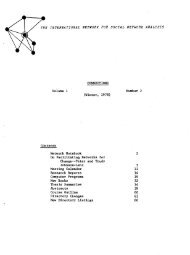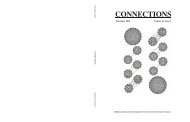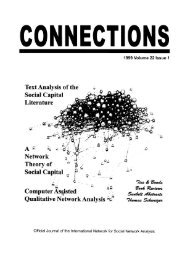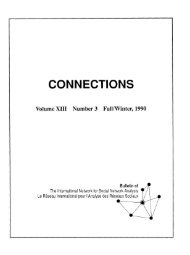Thomas Schweizer Remembered - INSNA
Thomas Schweizer Remembered - INSNA
Thomas Schweizer Remembered - INSNA
You also want an ePaper? Increase the reach of your titles
YUMPU automatically turns print PDFs into web optimized ePapers that Google loves.
<strong>Thomas</strong> <strong>Schweizer</strong> 1949-99<br />
One of the leading European anthropologists, a devotee of network research, cognitive and<br />
comparative anthropology, is dead at the age of forty nine . <strong>Thomas</strong> <strong>Schweizer</strong>, Director of the<br />
Institute of Ethnology at the University of Cologne, Germany, died on March 1, of complications<br />
resulting from Leukemia .<br />
For his outstanding work in science and institution building, <strong>Schweizer</strong> became the first<br />
anthropologist ever to win the prestigious Leibniz five year award of the DFG (Germany's NSF)<br />
in 1995 . The Leibniz award provides young senior scientists with "nonbureaucratic" funding in<br />
the "prime time" of their academic careers . <strong>Schweizer</strong> - free to choose what to do with funding -<br />
dedicated it to launch a major project on networks and cognition involving graduate students at<br />
Cologne and colleagues from abroad - Irvine, Florida, Paris and Caen . While he supported 7<br />
graduate students to do fieldwork and to write their Ph .D . thesis under that common framework,<br />
he took the time for theoretical and comparative, empirical synthesis . The first major outcome<br />
was a book published in German on "Patterns of Social Order : Network Analysis as a<br />
Foundation for Cultural Anthropology" (Muster Sozialer Ordnung 1996) . A second book, on<br />
Social Networks and Ethnography: Rethinking the Foundations ofSocial/Cultural Anthropology<br />
was in progress as the finale to the project . In the manuscript, he argues that the fundamental<br />
building blocks of society, economy, politics and communication are networks of actors<br />
connected by such ties as kinship, friendship, economic exchange, and social support . Network<br />
analysis is able to arrive at structural descriptions of patterns of social action as well as<br />
explanations of strategic action and their complex outcomes . The explanatory model is enriched<br />
and grounded, however, when cognitive anthropological methods are used to elicit actor<br />
schemas that circumscribe the decision-making of actors within network constraints . The<br />
network paradigm not only accounts for structure and dynamics of social action internal to a<br />
19<br />
<strong>Thomas</strong> <strong>Schweizer</strong> <strong>Remembered</strong><br />
by Douglas R . White'<br />
University of California, Irvine<br />
Networks, Cognition and Ethnography<br />
'Thanks to Margarete and Nikolaus <strong>Schweizer</strong>, as well as Michael Schnegg and Michael Casimir<br />
for their help in putting together this brief biography .
20 <strong>Thomas</strong> <strong>Schweizer</strong> <strong>Remembered</strong><br />
society/economy/polity or local context, but is used to represent the embedding of local cases<br />
in the larger context through specific patterns of network ties .<br />
The evolution of <strong>Schweizer</strong>'s visionary approach to network thinking and empirical approaches<br />
in anthropology can be divided into three overlapping phases of his career . I) First came his<br />
dissertation and subsequent work on comparative (cross-cultural) testing of anthropological<br />
theories . II) Next, his fieldwork with Margarete <strong>Schweizer</strong> in a village in Java, publication of<br />
numerous ethnographic articles on Indonesia, and the culminating publication as a book of his<br />
Habilitation thesis which qualified him to enter the tenured professorial ranks . III) Third,<br />
beginning with some analyses of his Javanese materials, he turned to processual, structural and<br />
network analysis and undertook a rigorous integration of ethnographic and comparative work .<br />
I . Cross-Cultural Research 1968-1983<br />
<strong>Thomas</strong> <strong>Schweizer</strong> began his career at Cologne in 1968/69 under Dr . Ulla Johansen, and became<br />
Institute Director in 1973 . After completing his thesis in 1975, he published his dissertation on<br />
"Methodological Problems of Cross-Cultural Research" in 1978 . As a cross-culturalist myself<br />
this was when I became aware of his work : we had as a Ph .D . candidate at Irvine, another<br />
Cologne student, Waltraud Kokot, and she agreed to help me review the book (in German) for<br />
the American Anthropologist (1980) . The book was translated and published by HRAF press<br />
in 1987 . In between <strong>Schweizer</strong> published a wide range of cross-cultural studies . Methodologically,<br />
he covered data quality controls (1978), the use of scaling, regression, and factor analytic<br />
methods (1978a,b, 1980) . Theoretically, he tested Whiting's puberty and initiations hypotheses<br />
(1978c) and correlates of alcohol use (1981) . Finally, in an introduction to Ethnological<br />
Research (1983), his chapter provided an introduction to cross-cultural methods . His work<br />
represented a high point of methodological and theoretical sophistication in the anthropological<br />
development of cross-cultural studies .<br />
II . Javanese Fieldwork (1978-), Habilitation (1984) and Cologne Reappointment<br />
<strong>Schweizer</strong> brought his quantitative, hypothesis-testing orientation to ethnographic analysis in<br />
his 1978/9 and 1984 fieldwork with Margarete <strong>Schweizer</strong>, who was skilled both in ethnography<br />
and linguistics . The fieldwork resulted in a large number of publications which ranged from<br />
empirical methods in fieldwork (1981), qualitative methods (1987) and economics (1980, 1985,<br />
1989) to issues of stratification (1985) . This work culminated in his Habilitation (Reisanbau in<br />
einem javanischen Dorf 1984) which was published in 1989 . He moved on to a Heisenberg<br />
Stipend at Cologne (1984-86), to a Professorship at Bayreuth (1986) and then a permanent<br />
position at Tiibingen 1986-1990 .<br />
In 1988, with Cologne colleague Hartmut Lang, <strong>Schweizer</strong> was funded by the DFG to conduct<br />
a grand tour of cross-cultural research projects in the U .S . (HRAF, Irvine and elsewhere) as part<br />
of a funded research project on causes and consequences of conflict that combined cross-cultural<br />
studies with six ethnographic field studies by University of Cologne/Tubingen graduate students .<br />
This trip provided my first face-to-face discussions with <strong>Thomas</strong>, and led to my invitation to the<br />
DFG funded conference on conflict in Bad Godesberg . The most enjoyable scholarly year of my<br />
life was the subsequent invitation to join <strong>Schweizer</strong> at Cologne as an Alexander von Humboldt
<strong>Thomas</strong> <strong>Schweizer</strong> <strong>Remembered</strong> 21<br />
awardee, at <strong>Schweizer</strong>'s nomination . Between cross-cultural, longitudinal, and social networks<br />
research, we had a lot in common .<br />
While still at Tubingen, before his reappointment at Cologne as Institute Director, <strong>Schweizer</strong>'s<br />
work branched out to include network analysis (1988, 1989), the study of social change (1990)<br />
and methods of cognitive anthropology applied to the belief system of a Javanese mystic (1988) .<br />
His 1989 edited book on NetworkAnalysis: Ethnological Perspectives (in German) included his<br />
introduction on network analysis as a modern form of structuralism and chapters on network<br />
analysis of his Javanese village kinship, economic and religious ties as well as network analysis<br />
by microcomputer .<br />
It was through a friend, K .H . Reuband, that <strong>Schweizer</strong>'s attention was drawn to network analysis<br />
very early in his undergraduate years, about 20 years before he started publishing in the field<br />
himself. Edward Laumann - back then a visiting professor at the University of Cologne -<br />
advocated Clyde Mitchell's book on Social Networks in Urban Situations as opening a new<br />
paradigm to structural analysis . A friend told <strong>Thomas</strong> <strong>Schweizer</strong> about the book, which greatly<br />
influenced his thinking on anthropology . Cologne sociologists Rene Koenig, Erwin K . Scheuch<br />
and Rolf Ziegler, another network researcher, also had a major role in shaping <strong>Thomas</strong>'s<br />
understanding of social science, as did his study of psychology .<br />
More or less two decades later network analysis, social change, longitudinal studies, world<br />
systems, and discrete structure analysis, as an enrichment of ethnographic analysis, came into<br />
focus in his own research . His early work on some of the latter topics included studies on<br />
process analysis in ethnology (1989), social change in the previous century in Indonesia (1990),<br />
trade networks and state development in the early colonial regimes in Southeast Asia (1991), and<br />
radical social change in Communist China (1991) .<br />
III . Processual, Structural and Network Analysis : the Directorship years (1990-)<br />
The Cologne Institute of Ethnology built by Johansen and <strong>Schweizer</strong> functioned as undoubtedly<br />
the finest and most cooperative anthropology department it has ever been my pleasure to witness<br />
in my 35 year career in anthropology . I made every effort to return each year since 1990 to<br />
collaborate with an outstanding group of colleagues and students there . In so doing, I became<br />
by some accounts <strong>Thomas</strong>'s next closest professional colleague after Hartmut Lang, a friend of<br />
the <strong>Schweizer</strong> family, host to Nikolaus <strong>Schweizer</strong>'s "semester abroad," and a kind of `working<br />
member' of the Institute .<br />
These years, in spite of the new administrative burdens as a much beloved director of the<br />
Cologne Institute, were <strong>Thomas</strong>'s most productive . Not only was he able to continue his studies<br />
of Javanese social networks (cited above) and ritual organization (1993), but he was able to open<br />
up a number of new initiatives . These included : 1) processual analysis (subject of a 1989<br />
article), 2) the development of network and discrete structure approaches to thinking relationally<br />
about fundamental problems in social anthropology, 3) applying networks to cross-cultural<br />
analysis as in the conflict project, and 4) reopening issues of anthropological method and<br />
epistemology at a still deeper level .<br />
After my first return trip to Cologne after working with Duquenne in France on discrete structure<br />
analysis, <strong>Schweizer</strong> began a series of studies we had envisioned together, applying discrete
22 <strong>Thomas</strong> <strong>Schweizer</strong> <strong>Remembered</strong><br />
structure and lattice analysis to the problem of the dual structure of property-ownership . His<br />
Current Anthropology (1993) and Indonesia Circle (1993) articles were among the most<br />
successful applications of Galois lattice analysis to problems in social anthropology . He<br />
summarized his comparative results in a 1998 article . In 1996 he applied discrete structure<br />
analysis to the longitudinal study of structural change - looking at his revolutionary Chinese<br />
village data - in the White and Duquenne (1996) volume on Networks and Discrete Structure<br />
Analysis .<br />
My own work on large-scale network and kinship analysis comes directly out of the days when,<br />
in a series of Cologne and Paris workshops (my sojourns to Paris being also the result of<br />
<strong>Thomas</strong>'s sponsorship for me of a Humboldt stipend), <strong>Thomas</strong>, Hartmut and I would gather with<br />
Vincent Duquenne and other social scientists in Paris to apply discrete structure analysis to<br />
social science problems . Watching <strong>Thomas</strong> grapple with a Galois lattice analysis of his<br />
Javanese kinship data led to my realization of a simpler way to model the longitudinal and<br />
partial-order relationships inherent in kinship structures, via Paul Jorion's formalization of the<br />
p-graph . Later, hearing Hartmut describe his demographic simulation programs to a rapt<br />
audience of Parisian ethnologists in Michael Houseman's "Kinship and Computing" workshops,<br />
it dawned on me how to do permutation tests of kinship structures as Monte Carlo simulations<br />
that controlled for demographic constants while varying marriage choices . Many of the ideas<br />
born of those days of workshops and collaborative projects have yet to appear in print, but under<br />
<strong>Thomas</strong>'s leadership a whole series of high quality contributions flowed out of Cologne that<br />
combined ethnographic research with methodology and theoretical innovations . The Humboldt<br />
Foundation and NSF jointly supported <strong>Thomas</strong> and myself from 1993-95 in a Transatlantic<br />
Cooperation program that also involved French scholars such as Degenne, Houseman, and<br />
Jorion . The 1998 Cambridge press volume on Kinship, Networks and Exchange was one of the<br />
results, and the initiation of a series of longitudinal cases studies of large-scale social networks<br />
for the study of social class, elites, and complex kinship systems was another .<br />
During these years he nominated and won a second A . von Humboldt award for Russ Bernard<br />
in 1995-96 . What Russ mentions in the preface of his new book reflects the same personal and<br />
intellectual hospitality I have experienced . At around the same time <strong>Thomas</strong> launched a series<br />
of new projects . He found that Polly Wiessner (Max Planck Institute, Andechs), who had done<br />
Harvard field research on the Dobe !Kung, was willing to share her kinship and economic<br />
exchange data for the !Kung . On this project, published in 1996 and 1997 articles, he enlisted<br />
Lothar Krempel (Max Planck Institute, Cologne) for his expertise in network visualizing . The<br />
results of this project, on !Xharo exchange, was a superb network analysis of an economy<br />
embedded entirely within specialized gift-giving exchange relationships .<br />
<strong>Schweizer</strong>'s fluency with conceptual and theoretical issues, combined with flexible and<br />
insightful use of a variety of interrelated methodologies, made him a master teacher and<br />
researcher. This is reflected in all of his work . <strong>Schweizer</strong>'s depth as a theoretician becomes<br />
evident in his chapter on "Epistemology : The Nature and Validation of Anthropological<br />
Knowledge," which appeared in Russ Bernard's Handbook ofMethod in Cultural Anthropology<br />
(1998) . The fieldwork tradition and comparative ethnology have been the unifying threads<br />
among the different theoretical and methodological schools in anthropology . How to produce<br />
valid descriptions and how to establish comparative theoretical syntheses of these descriptions<br />
are among the central epistemological problems . Positivism, hermeneutics and<br />
postmodernism/radical constructivism are discussed as major frameworks guiding anthropological<br />
research, for which three problems are addressed in terms of focal interrelationships : reality,
<strong>Thomas</strong> <strong>Schweizer</strong> <strong>Remembered</strong> 23<br />
relativism and truth ; empathic verstehen and explanation ; and theory construction and<br />
cumulative knowledge .<br />
The edited volume Kinship, Networks and Exchange (<strong>Schweizer</strong> and White 1998) encapsulates<br />
work being done at Cologne and elsewhere which was presented at a conference he organized<br />
in 1994 . These studies link the study of decision-making and economic exchange (incorporating<br />
rational choice and game-theoretical models) with understanding cultural and individual<br />
cognitive schemata that operate within network and social structural constraints to motivate,<br />
empower and drive social action observed in richly described ethnographic settings .<br />
His textbook on "Patterns of Social Order : Network Analysis as a Foundation for Cultural<br />
Anthropology" (Muster Sozialer Ordnung 1996) reviews the state of network research against<br />
the background of the various structuralisms in social anthropology . Noting the neglect of social<br />
structure in recent interpretative and postmodern theories of cultural texts, it shows the<br />
usefulness of network analysis for studying the social embeddedness of meanings and emergent<br />
social order . The final chapters review network explanations on the relations between action<br />
and structure, and introduce graph-theoretic statistical procedures for dissecting social ties .<br />
To enable him to continue that scientific track, <strong>Schweizer</strong> became the first anthropologist to win<br />
the Leibniz Award, which is where my reflections began . With these funds he supported<br />
graduate and junior faculty research, built up the computing and library facilities of the institute,<br />
and invited a series of scholars to provide additional workshops and courses at the Institute . Russ<br />
Bernard and Michael Schnegg taught an intensive course on systematic techniques of data<br />
collection and analysis in anthropology . Lilyan Brudner and I provided workshops on<br />
longitudinal network research and multimedia ethnography . The more lengthy stays from Russ<br />
and myself were accompanied by short term visits from many other network researchers<br />
including J . Clyde Mitchell, Lin Freeman, Per Hage, Al Klovdahl, Peter Bearman, and many<br />
others .<br />
In partial repayment of the immense generosity shown to us by <strong>Thomas</strong> and members of the<br />
Institute, we hosted a joint project in Costa Mesa - adjacent to the Irvine campus - where 12<br />
Cologne students headed by <strong>Thomas</strong> as field director carried out a four week intensive field<br />
training session in urban network ethnography . The results were published by <strong>Schweizer</strong>,<br />
Schnegg and Berzborn (1998). The project succeeded admirably in the collection of egocentered<br />
network data . The project design of <strong>Thomas</strong> and the students also included a test of Al<br />
Klovdahl's ideas about random-walk networks in urban areas via weak-tie data collection. An<br />
on-the-spot reorientation in Irvine towards collecting strong tie social support data undermined<br />
that goal, but we learned a great deal about designing urban network research . <strong>Thomas</strong> had<br />
planned to follow up on what we had learned with a further urban network study in Cologne, but<br />
that was not to be .<br />
Many social scientists in network studies and anthropology formed lasting ties with faculty and<br />
graduates of the Cologne Institute that will continue to produce research influenced by <strong>Thomas</strong>'s<br />
vision, support and his many contributions . Joint fieldwork collaborations between UCI and<br />
Cologne students in the Costa Mesa studies, for example, led to invitations of several of our<br />
students to Cologne where they have formed lasting professional and personal relationships .<br />
Conversely, we have invited some of their students and faculty to join our research projects .<br />
<strong>Thomas</strong>'s Ph .D . student Michael Schnegg, for example, joined our team doing research on<br />
Tlaxcala, Mexico . He is doing a resurvey of our community-level network study of kinship and
24<br />
<strong>Thomas</strong> <strong>Schweizer</strong> <strong>Remembered</strong><br />
compadrazgo, and we already have several jointly authored analyses of the previously collected<br />
data in press .<br />
It is not only his outstanding scientific abilities that made <strong>Thomas</strong> <strong>Schweizer</strong> such an<br />
extraordinary colleague . Just as important, he created an atmosphere where creativity and<br />
cooperation would grow . These ideas and the ties that. grew in this atmosphere will live far into<br />
the future .<br />
Books<br />
Bibliography of <strong>Thomas</strong> <strong>Schweizer</strong><br />
1978, "Methodenprobleme des interkulturellen Vergleichs . Probleme, Losungsversuche,<br />
exemplarische Anwendung ." Kolner ethnologische Mitteilungen, Band 6 .405 Seiten . Koln<br />
and Wien : Bohlau-Verlag, 1978 (=PhD dissertation) .<br />
1981, "Wissenschaftstheorie fur die ethnologische Praxis ." (with H . Lang, B . Riese and G .<br />
Gerdsmeier) . Ethnologische Skripten, Band 1 . 178 Seiten . Berlin : Reimer-Verlag, 1981 .<br />
1987, "Methodological Problems of Cross-cultural Comparison ." 226 Seiten . New Haven :<br />
Human Relations Area Files Press, 1987 (= translation of part I of the PhD dissertation) .<br />
1989, "Netzwerkanalyse : Ethnologische Perspektiven ." (editor) . 230 Seiten . Berlin : Reimer-<br />
Verlag, 1989 .<br />
1989, "Reisanbau in einem javanischen Dorf: Eine Fallstudie zu Theorie and Methodik der<br />
Wirtschaftsethnologie ." Kolner ethnologische Mitteilungen, Band 9 . 720 Seiten . Koln and<br />
Wien : Bohlau-Verlag, (=Habilitation) .<br />
1993, <strong>Schweizer</strong>, <strong>Thomas</strong>, Margarethe <strong>Schweizer</strong> and Waltraud Kokot (eds .), "Handbuch der<br />
Ethnologie . Festschrift fur Ulla Johansen ." 664 pages . Berlin : Reimer-Verlag, 1993 .<br />
1996, "Muster sozialer Ordnung : Netzwerkanalyse als Fundament der Sozialethnologie ." 306<br />
pages . Berlin : Reimer-Verlag, 1996 .<br />
1998, <strong>Schweizer</strong>, <strong>Thomas</strong> and Douglas R . White, "Kinship, Networks and Exchange ." Structural<br />
Analysis in the Social Sciences Series . New York and Cambridge : Cambridge University<br />
Press, 1998 .<br />
Papers<br />
1978, "Data Quality and Data Quality Control in Cross-cultural Studies ." Behavior Science<br />
Research (New Haven, Conn .) 13 : 125-150,1978 .<br />
1978, "Statistische Gesetze and statistische Argumentation in der Ethnologie ." Anthropos<br />
(Fribourg) 73 : 337-366, 1978 .<br />
1978, "Lineare Strukturmodelle in der Ethnologie : Eine Einfiihrung in die statistische<br />
Kausalanalyse (Teil I) ." Sociologus (Berlin) 28 : 1-35, 1978 .<br />
1978, "Lineare Strukturmodelle in der Ethnologie : Ein Test von Whitings Theorie der<br />
Pubertatsriten ." Sociologus (Berlin) 28 : 149-173, 1978 .
<strong>Thomas</strong> <strong>Schweizer</strong> <strong>Remembered</strong><br />
1980, "Multidimensional Scaling of Internal Differences in Similarity Data : The Perception of<br />
Interethnic Similarity in Indonesia ." Journal of Anthropological Research (Albuquerque,<br />
New Mex .) 36 : 149-173, 1980 .<br />
1980, "Konsumverhalten im landlichen Java." Sociologus (Berlin) 30 : 123-153, 1980 .<br />
1980, "Regressions- and Faktorenanalyse ethnologischer Daten ." Zeitschrift far Ethnologie<br />
(Berlin) 105 : 1-31, 1980 .<br />
1981, "Alkoholkonsum im interkulturellen Vergleich ." In : G . Volger and K . von Welck (Hg .),<br />
Rausch and Realitat : Drogen im Kulturvergleich . Koln : Rautenstrauch-Joest-Museum, 76-<br />
84, 1981 . 2 . Auflage Reinbek : Rowohlt Taschenbuch Verlag, 134-152, 1982 .<br />
1981, "Die empirische Methode der Ethnologie : Feldforschung am Beispiel einer Dorfstudie auf<br />
Java." Sociologus (Berlin) 32 : 20-42, 1982 . Gekurzte Fassung in Mitteilungen der<br />
Universitat zu Koln, Sonderheft Universitatstage 1981, 17-21, 1981 .<br />
1983, "Interkulturelle Vergleichsverfahren ." In : H . Fischer (Hg .), Ethnologie : Eine Einfiihrung .<br />
Berlin : Reimer-Verlag, 427-445, 1983 . 3 . rev . Auflage, 421-39, 1992 .<br />
1985, "Soziale Schichtung im kolonialen Java ." Anthropos (Fribourg) 80 : 153-183, 1985 .<br />
1985, "Die Vielschichtigkeit der Feldsituation : Untersuchungen zur dorflichen Wirtschaft in<br />
Java ." In : H . Fischer (Hg .), Feldforschungen . Berlin : Reimer-Verlag, 263-288, 1985 .<br />
1986, "Kontinuitat and Wandel im Reisanbau : Eine Fallstudie aus Klaten/ Mitteljava ." In : H .<br />
Dun and R . Hanisch (Hg .), Sudostasien: Tradition and Gegenwart . Braunschweig :<br />
Westermann-Verlag, 203-220, 1986 .<br />
1987, "Das Entziffem einer fremden Kultur : Java als ethnologische Herausforderung ." In :<br />
Wissenschaft im Spannungsfeld zwischen den Kulturen . Schriften der Universitat Bayreuth,<br />
Nr . 1 . Bayreuth : 59-79, 1987 .<br />
1987, "Agrarian Transformation? Rice Production in a Javanese Village ." Bulletin of Indonesian<br />
Economic Studies (Canberra : Research School of Pacific Studies, ANU) 23 : 38-70, 1987 .<br />
1988, "Einen javanischen Mystiker verstehen : Kognitive Analyse von Uberzeugungen uber<br />
heilige Orte (tempat keramat) aus Majapahit ." Anthropos (Fribourg) 83 : 47-67, 1988 .<br />
1988, "Detecting Positions in Networks : A Formal Analysis of Loose Social Structure in Rural<br />
Java." American Anthropologist (Washington, D .C .) 90 : 944-951, 1988 .<br />
1989, "Netzwerkanalyse als moderne Strukturanalyse ." In : Th . <strong>Schweizer</strong> (Hg .),<br />
Netzwerkanalyse . Berlin : Reimer-Verlag, 1-32, 1989 .<br />
1989, "Verwandtschaftliche, wirtschaftliche and religiose Verflechtungen javanischer<br />
Haushalte : Eine positionale Netzwerkanalyse ." In : Th . <strong>Schweizer</strong> (Hg .), Netzwerkanalyse .<br />
Berlin : Reimer-Verlag, 113-132, 1989 .<br />
1989, "Netzwerkanalyse mit dem Mikrocomputer" In : Th . <strong>Schweizer</strong> (Hg .), Netzwerkanalyse .<br />
Berlin : Reimer-Verlag, 201-222, 1989 .<br />
1989, "Economic Individualism and the Community Spirit : Divergent Orientation Patterns of<br />
Javanese Villagers in Rice Production and the Ritual Sphere ." Modern Asian Studies<br />
(Cambridge) 23 : 277-312, 1989 .<br />
1989, "Perspektivenwandel in der ethnologischen Primar- and Sekundaranalyse : Zur<br />
25
26<br />
<strong>Thomas</strong> <strong>Schweizer</strong> <strong>Remembered</strong><br />
historischen and zur gegenwartigen Methodik des interkulturellen Vergleichs ." Kolner<br />
Zeitschrift fiir Soziologie and Sozialpsychologie (Opladen) 41(3) : 465-482, 1989 .<br />
1989, "Prozel3analyse in der Ethnologie : Eine Exploration von Verfahren and Problemen ."<br />
Zeitschrift far Ethnologie (Berlin) 114 : 55-74, 1989 .<br />
1990, "Mannerbiinde and ihr kultureller Kontext im weltweiten interkulturellen Vergleich ." In :<br />
G . Volger and K . von Welck (Hg .), Mannerbiinde - Mannerbande : Zur Rolle des Mannes<br />
im Kulturvergleich . Koln : Rautenstrauch-Joest-Museum, Band 1, 23-30, 1990 .<br />
1990, "A Century of Change in the Javanese Rural Economy : Contrasting Developments in<br />
Upland and Lowland Klaten ." Internationales Asienforum/ International Quarterly for Asian<br />
Studies (Miinchen) 21(1-2) : 259-277, 1990 .<br />
1990, "Margaret Mead and Samoa : Zur Qualitat and Interpretation ethnologischer<br />
Feldforschungsdaten ." In : B . Illius and M . Laubscher (Hg .), Transpacifica: Festschrift T .S .<br />
Barthel . Frankfurt : P . Lang Verlag, 441-53, 1990 .<br />
1991, "The Power Struggle in a Chinese Community, 1950-1980 : A Social Network Analysis<br />
of the Duality of Actors and Events ." Journal of Quantitative Anthropology (Dordrecht) 3 :<br />
19-44, 1991 .<br />
1991, "Handelsnetze and Stadtentwicklung in Sudostasien : Benkulen im Zeitalter der kolonialen<br />
Expansion, 1685-1824 ." In: W. Kokot and B .C . Brommer (Hg .), Ethnologische<br />
Stadtforschung . Berlin : Reimer Verlag, 45-74 (mistakes in the reprint), 1991 .<br />
1993, "Ritual as Action in a Javanese Community : A Network Perspective on Ritual and Social<br />
Structure" (with Elmar Klemm and Margarete <strong>Schweizer</strong>) . Social Networks (Amsterdam)<br />
15 : 19-48, 1993 .<br />
1993, "Perspektiven der analytischen Ethnologie ." In : Th . <strong>Schweizer</strong>, M . <strong>Schweizer</strong> and W .<br />
Kokot (Hg .), Handbuch der Ethnologie . Festschrift Ulla Johansen . Berlin : Reimer-Verlag,<br />
79-113, 1993 .<br />
1993, "The Cultural Use of Things : Consumption in Rural Java." Indonesia Circle (London) 61 :<br />
3-20, 1993 .<br />
1993, "The Dual Ordering of Actors and Possessions ." Current Anthropology (Chicago) 34 :<br />
469-483, 1993 .<br />
1993, "Die Sozialstruktur als Problem der ethnologischen Forschung ." Zeitschrift fiirEthnologie<br />
(Berlin) 117 (1992) : 17-40, 1993 .<br />
1996, "Actor and Event Orderings Across Time : Lattice Representation and Boolean Analysis<br />
of the Political Disputes in Chen Village/ China ." Social Networks (Amsterdam), Special<br />
Issue on Discrete Structure Analysis, 18 : 247-66, 1996 .<br />
1996, "Reconsidering Social Networks : Reciprocal Gift Exchange Among the! Kung ." Journal<br />
of Quantitative Anthropology (Dordrecht) 6: 147-70, 1996 .<br />
1997, "Embeddedness of Ethnographic Cases : A Social Networks Perspective ." Current<br />
Anthropology (Chicago) 38(5) :739-60, 1997 .<br />
1998, <strong>Schweizer</strong>, <strong>Thomas</strong>, Michael Schnegg and Susanne Berzborn : "Personal networks and<br />
social support in a multiethnic community of Southern California" . Social Networks<br />
(Amsterdam) 20 :1-21, 1998 .
<strong>Thomas</strong> <strong>Schweizer</strong> <strong>Remembered</strong> 27<br />
1998, <strong>Schweizer</strong>, <strong>Thomas</strong> and Douglas R . White, "Revitalizing the Study of Kinship and<br />
Exchange with Network Approaches" . In : T . <strong>Schweizer</strong> and D .R . White (Hg .), Kinship,<br />
Networks and Exchange . Cambridge : Cambridge Univ . Press, 1998 .<br />
1998, White, Douglas R . and <strong>Thomas</strong> <strong>Schweizer</strong>, "Kinship, Property Transmissions, and<br />
Stratification in Javanese Villages ." . In : T. <strong>Schweizer</strong> and D.R . White (Hg.), Kinship,<br />
Networks and Exchange . Cambridge : Cambridge Univ . Press, 1998 .<br />
1998, "Epistemology : The Nature and Validation of Anthropological Knowledge ." In : H .R .<br />
Bernard (Hg .) Handbook of Method in Cultural Anthropology . Walnut Creek, CA : AltaMira<br />
Press (Sage), 1998 .<br />
In press, "Besitzstrukturen : Eine vergleichende Analyse ." Archiv far Volkerkunde (Wien) .



